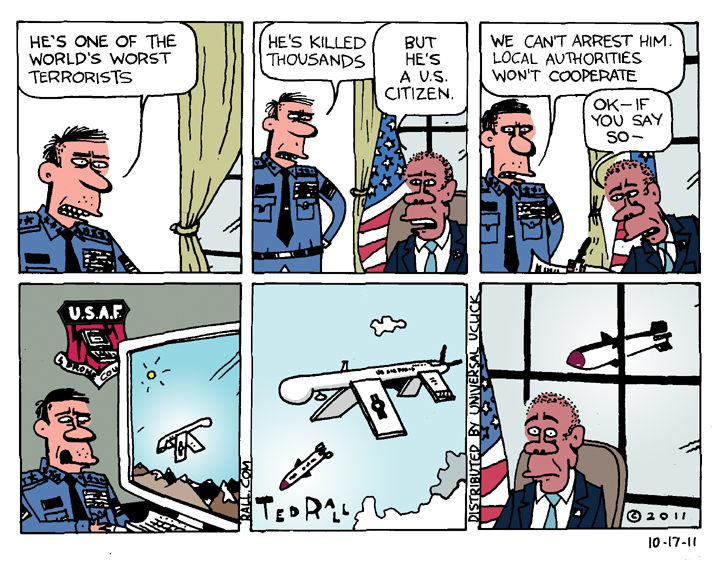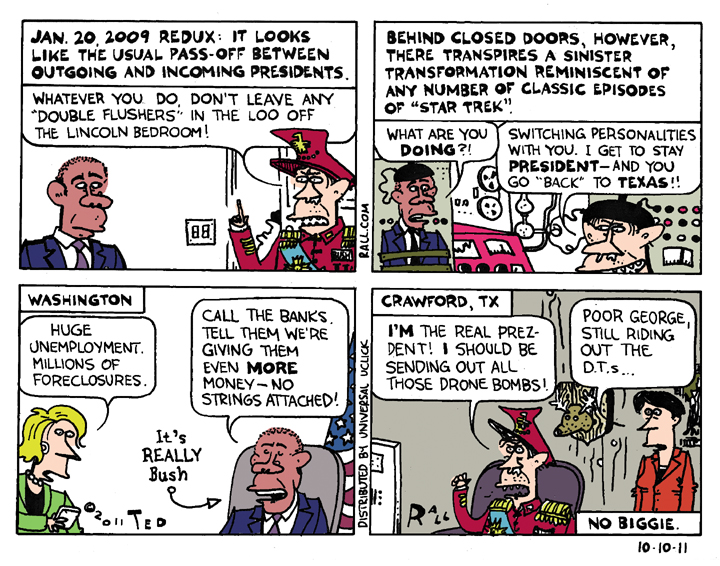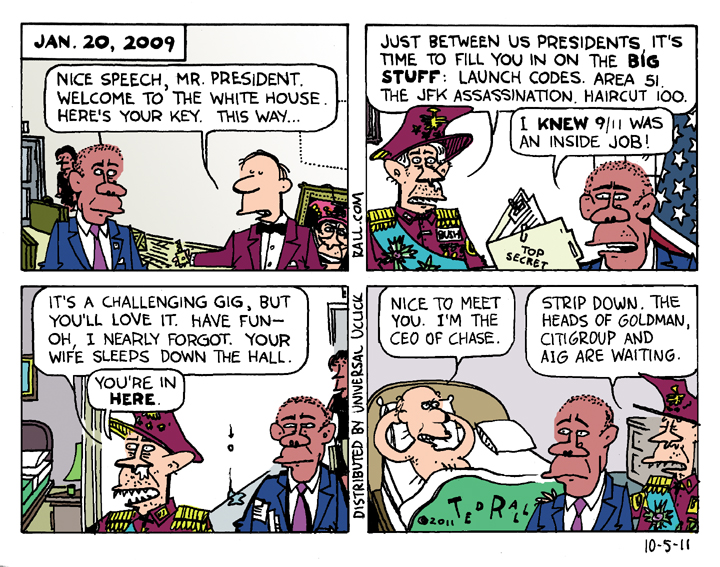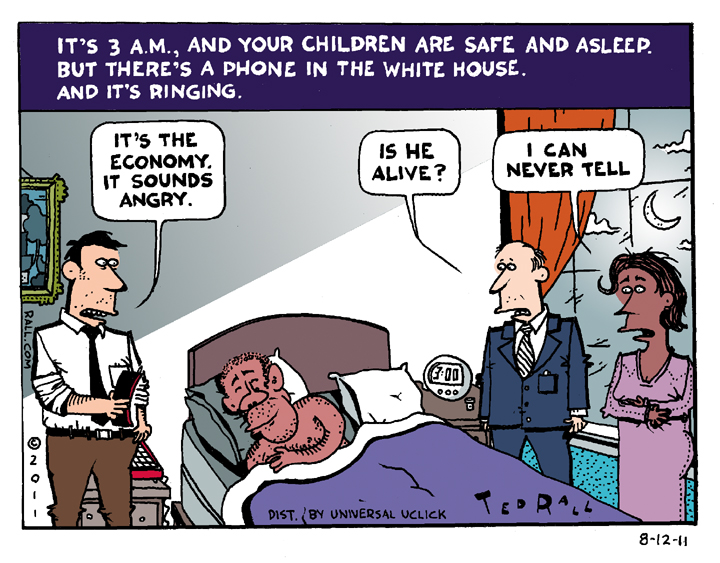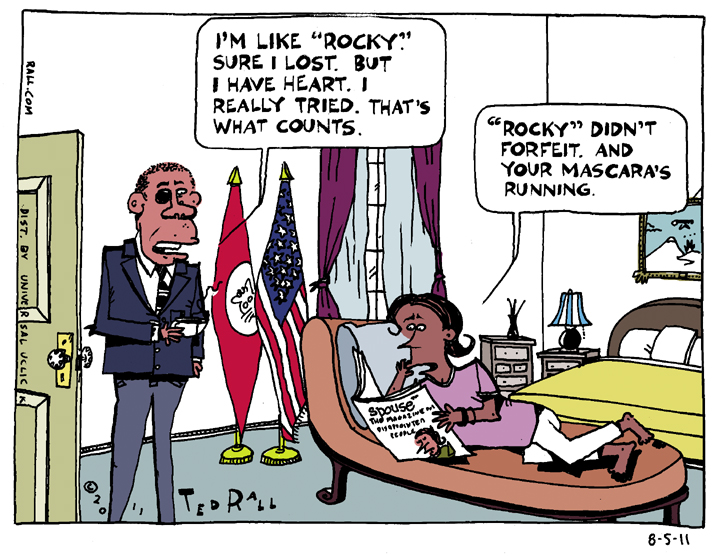A secret presidential memo argues that US citizens can be assassinated if they’re terrorists and are hard to arrest.
SYNDICATED COLUMN: Stop Demanding Demands
Connecting the Revolutionary Dots in Occupied Washington
“Our demand is that you stop demanding that we come up with demands!”
I thought about that line a lot this past week. (It’s from a recent cartoon by Matt Bors.) I was at Freedom Plaza in Washington, a block from the White House, at the protest that began the whole Occupy movement that has swept the nation: the October 2011 Stop the Machine demonstration.
It has been one of the most exciting weeks of my life.
Stop the Machine, timed to begin on the October 6th anniversary of the U.S. invasion of Afghanistan ten years ago, was based on a simple, powerful premise. A coalition of seasoned protesters including Veterans for Peace, CodePink, Fellowship of Reconciliation, Progressive Democrats of America and Peace Action would take over a public space, then refuse to leave until our demand–withdrawal from Afghanistan–was met.
Adbusters magazine preempted our demonstration, which had been widely publicized, with Occupy Wall Street.
It’s the sort of thing an unscrupulous businessman might do.
But it’s all good. The sooner the revolution, the better. And the Occupy folks did choose a better name.
Like other old-timers (I’m 48), I criticized Occupy Wall Street for its wanky PR and street theater shenanigans. Yoga, pillow fights and face painting for the masses, but do the masses give a damn? Critiquing with love, I joined others in the media for demanding specific demands. That, after all, is how agitators used to do things. Hijack a plane and ask for money. Take over a prison until the warden agrees to improved conditions. Strike until you get a raise.
That’s one of the things that changed on 9/11. No one ever claimed responsibility for the attacks. No group issued any demands.
The Stop the Machiners in Freedom Plaza are mostly Gen Xers in their 40s and Baby Boomers in their 50s and 60s-. There are hundreds, sometimes thousands, of them, many spending the night in tents. Eight blocks away in McPherson Square is Occupy DC, the decidedly younger and whiter (mostly Gen Yers in their 20s) Washington spin-off of Occupy Wall Street. As you’d expect, Occupy is wilder and more energetic. As you’d also expect, Stop the Machine is calmer and more organized.
Stop the Machine has Portapotties.
It even has a station where you can wash your hands after you use the Portapotties.
“What are your demands?” my friends back home emailed me. Trust me: No one is more aware of the need to issue demands than the protesters of the Occupy and Stop the Machine movements (who obviously ought to merge).
Coming up with demands is job one. But job one is slow going. This is not merely a non-hierarchical but an anti-hierarchical movement. Everyone gets an equal say. Influenced by the Occupy movement (and other progressive protests, such as the anti-globalization struggle), Stop the Machine has embraced a system in which all decisions are arrived at by unanimous consensus. Anyone, regardless of their social status or education, can block a decision agreed upon by hundreds of other people.
Before last week I thought this decision-making process was madness. No leaders means inefficiency, right? Well, right. Meetings drag on for hours. Often nothing, or very little, gets done. Discussions go off on tangents. Poorly informed and even mentally disabled people get to talk. And everyone–even those of us with years of political experience and education–have to sit there and listen.
It sucks. And it’s great. It’s great because it gets out from behind our keyboards and out into the streets and in direct contact with our fellow human beings.
I’m as snotty as they come. Out on the Plaza, however, snark is a liability. A scary homeless guy heckled me while I gave a speech calling for revolution over reform of the system; he went on so long and so intensely that a D.C. cop tried to take him away. I couldn’t just click away. I was forced to engage with him. To discuss. To agree to disagree.
Revolution is a messy, slow process. We are just beginning to claw away at the velvet ropes of alienation that simultaneously comfort and confine us. We’re beginning to see that the things we hold so dear–our place in the class structure, our educational credentials, our shrinking but oh-so-clever circles of friends–are means of oppression.
There were 15 committees formed to come up with demands about various topics, which would eventually be presented to the General Assembly for discussion and, with luck, approval by consensus.
I joined the Economics and Finance committee.
“I don’t understand the word ‘neoliberal’,” a woman who looked to be about 30 said.
“It means conservative,” a guy answered.
No it doesn’t.
I shut up. In consensus meetings, you quickly learn to choose your battles. Those battles can run late into the night.
I urged our committee to decide whether we were revolutionaries or reformists.
“Why does it matter?” asked our “facilitator” (the leader-who-is-not-a-leader).
We went on to waste the next several months debating the distinctions between revolutionaries who seek to overthrow the system, reformists who accept its basic structure but seek to improve upon it, and revolutionists-posing-as-reformers who issue what I call “unreasonable reasonable” demands–demands that are popular with the population but that the system can’t concede without undermining the essential nature of their relationship to the people, the idea being to expose the government as the uncaring, unresponsive monsters, thus radicalizing the moderates and fence-sitters.
OK, it was about an hour. It only seemed like months.
We only came up with two demands for the general assembly to consider. But that doesn’t matter.
The process of discussion educates everyone involved in it. Obviously, the better informed share information with the less informed. But the knowledge flow goes both ways. The better informed learn what is not known, what must be transmitted to the public at large. And of course the less informed about one topic are usually better informed about another.
Demands will surface. But there’s no rush. Let the intellectual cross-fertilization run its course.
Besides, it’s fun to watch the ruling-class-owned media squirm as they wait.
(Ted Rall is the author of “The Anti-American Manifesto.” His website is tedrall.com.)
COPYRIGHT 2011 TED RALL
AL JAZEERA COLUMN: The De-politicization of Political Media
US political ideologies are converging on the right, but the power of ideas doesn’t matter in this popularity contest.
“President Obama’s support is eroding among elements of his base,” began a front-page story in the September 16th New York Times. Experienced readers understood what was meant. The U.S. Democratic Party “base” is comprised of liberals, progressives (to the left of liberals), and self-identified leftists (composed of socialists, communists and left libertarians).
These and other groups that compose the Democratic coalition—feminists, gays and lesbians, labor unions, etc.—pursue separate agendas. For decades American media consumers received granular, detailed analyses of each segment, their goals, accomplishments and failures to influence the party and the nation. No longer. These factions are increasingly being excluded and omitted from coverage in favor of something new: a formless, mushy whatever.
Call it “the base.”
Conventional wisdom—in other words, talking points repeated by columnists for big-city newspapers and cable-television news commentators—holds that the American electorate is roughly divided as follows: 40 percent who consistently vote Democratic, and another 40 percent who always vote Republican. These 80 percent of party loyalists are their base: if they vote at all, they always vote for the same party.
The outcome of elections depends on the whims of the remaining 20 percent, “swing voters” who may vote Democratic one election, Republican the next.
With a few exceptions, strategists and candidates for the two major parties direct most of their appeals to this “vital center” of the ideological spectrum. “Where else are they going to go?” is the constant, cynical refrain of political operatives when asked about the bases of the parties. If you’re a liberal voter, in other words, you probably won’t vote Republican. If you’re a conservative voter, you won’t jump to the Democrats no matter how disappointed you are with “your” party. (Historically, however, the Republican Party tends to coddle its right-wing base—with rhetoric as well as policy shifts—more than the Democrats pay attention to the left.)
The quest for swing voters relies on simple math. Convince a “swing voter” to switch from their party to yours and you’re up two votes. Lose a “base” voter and you’re down one. Swing voters count double.
AL JAZEERA COLUMN: United We Bland
Calls for a return to post-9/11 “unity” in the US, flirt with the elementary constructs of fascism, author says.
In the days and weeks after 9/11 the slogan was everywhere: T-shirts, bumper stickers, billboards that previously read “Your Ad Here” due to the dot-com crash, inevitably next to an image of the American flag.
The phrase carried with it a dark subtext. It wasn’t subtle:
United We Stand —or else.
Or, as George W. Bush, not known for his light rhetorical touch, put it: “You’re either with us or against us.”
“Us” was not meant to be inclusive. Le Figaro’s famous “nous sommes tous américains” headline aside, non-Americans were derided on Fox News (the Bush Administration’s house media organ) as “cheese-eating surrender monkeys.” (Never mind that that phrase, from the TV show “The Simpsons,” was conceived as derisive satire of the Right, which frequently derided the French as intellectual and thus weak and effete.)
Many Americans were disinvited from the “us” party of the early 2000s. Democrats, liberals, progressives, anyone who questioned Bush or his policies risked being smeared by Fox, right-wing talk radio hosts and their allies. The Wall Street Journal editorial page, for example, called me “the most anti-American cartoonist in America.”
For a day or two after the attacks on New York and Washington, it was possible even for the most jaundiced leftist to take comfort in patriotism. We were shocked. More than that, we were puzzled. No group had claimed responsibility. (None ever did.) Who was the enemy? Sure, there was conjecture. But no facts. What did “they” want?
“We watched, stupefied—it was immediately a television event in real time—and we were bewildered; no one had the slightest idea of why it had happened or what was to come,” writes Paul Theroux in the UK Telegraph. “It was a day scorched by death—flames, screams, sirens, confusion, fear and extravagant rumors (‘The Golden Gate Bridge has been hit, Seattle is bracing’).”
Politically, the nation reminded deeply divided by the disputed 2000 election. According to polls most voters believed that Bush was illegitimate, that he had stolen the presidential election in a judicial coup carried out by the Supreme Court. Even at the peak of Bush’s popularity in November 2001—89 percent of the public approved of his performance—47 percent of respondents to the Gallup survey said that Bush had not won fair and square. During those initial hours, however, most ordinary citizens saw 9/11 as a great horrible problem to be investigated, analyzed and then solved. Flags popped up everywhere. Even liberal Democrats gussied up their rides to make their cars look like a general’s staff car.
Dick Cheney and his cadre of high-level fanatics at 1600 Pennsylvania Avenue were salivating over newly-drawn-up war plans. “There just aren’t enough targets in Afghanistan,” Defense Secretary Donald Rumsfeld told Cheney and Secretary of State Colin Powell. “We need to bomb something else to prove that we’re, you know, big and strong and not going to be pushed around.”
AL JAZEERA COLUMN: Libya: The triumphalism of the US media
Obama and the US media are taking credit for Gaddafi’s downfall, but it was the Libyan fighters who won the war.
The fall of Moammar Gaddafi was a Libyan story first and foremost. Libyans fought, killed and died to end the Colonel’s 42-year reign.
No doubt, the U.S. and its NATO proxies tipped the military balance in favor of the Benghazi-based rebels. It’s hard for any government to defend itself when denied the use of its own airspace as enemy missiles and bombs blast away its infrastructure over the course of more than 20,000 sorties.
Still, it was Libyans who took the biggest risks and paid the highest price. They deserve the credit. From a foreign policy standpoint, it behooves the West to give it to them. Consider a parallel, the fall 2001 bombing campaign against the Taliban. With fewer than a thousand Special Forces troops on the ground in Afghanistan to bribe tribal leaders and guide bombs to their targets, the U.S. military and CIA relied exclusively on air power to allow the Northern Alliance to advance. The premature announcement that major combat operations had ceased, followed by the installation of Hamid Karzai as de facto president—a man widely seen as a U.S. figurehead—set the stage for what would eventually become America’s longest war.
As did the triumphalism of the U.S. media, who treated the “defeat” (more like the dispersing) of the Taliban as Bush’s victory. The Northern Alliance was a mere afterthought, condescended to at every turn by the punditocracy. To paraphrase Bush’s defense secretary Donald Rumsfeld, the U.S. went to war with the ally it had, not the one it would have liked to have had. America’s attitude toward Karzai and his government reflected that in many ways: snipes and insults, including the suggestion that the Afghan leader was mentally ill and ought to be replaced, as well as years of funding levels too low to meet payroll and other basic needs, thus limiting its power to metro Kabul and a few other major cities. In retrospect it would have been smarter for the U.S. to have graciously credited (and funded) the Northern Alliance with its defeat over the Taliban, content to remain the power behind the throne.
Despite this experience in Afghanistan “victory” in Libya has prompted a renewal of triumphalism in the U.S. media.
Like a slightly drunken crowd at a football match giddily shouting “U-S-A,” editors and producers keep thumping their chests long after it stops being attractive.
When Obama announced the anti-Gaddafi bombing campaign in March, Stephen Walt issued a relatively safe pair of predictions. “If Gaddafi is soon ousted and the rebel forces can establish a reasonably stable order there, then this operation will be judged a success and it will be high-fives all around,” Walt wrote in Foreign Policy. “If a prolonged stalemate occurs, if civilian casualties soar, if the coalition splinters, or if a post-Gaddafi Libya proves to be unstable, violent, or a breeding ground for extremists…his decision will be judged a mistake.”
It’s only been a few days since the fall of Tripoli, but high-fives and victory dances abound.
“Rebel Victory in Libya a Vindication for Obama,” screamed the headline in U.S. News & World Report.
AL JAZEERA COLUMN: The US’ War of Words Against Syria
The US war of words against Syria is marred by hypocrisy and a lack of realism.
You’d need a team of linguists to tease out the internal contradictions, brazen hypocrisies and verbal contortions in President Barack Obama’s call for Syrian President Bashar al-Assad to relinquish power.
“The future of Syria must be determined by its people, but…”
The “but” belies the preceding phrase—particularly since its speaker controls the ability and possible willingness to enforce his desires at the point of a depleted uranium warhead.
“The future of Syria must be determined by its people, but President Bashar al-Assad is standing in their way. His calls for dialogue and reform have rung hollow while he is imprisoning, torturing and slaughtering his own people,” Obama continued. One might say the same thing of Obama’s own calls for dialogue and reform in Iraq and Afghanistan. Except, perhaps, for the fact that the Iraqis and Afghans being killed are not Obama’s “own people”. As you no doubt remember from Bush’s statements about Saddam Hussein, American leaders keep returning to that phrase: “killing his own people”.
Now the Euros are doing it. “Our three countries believe that President Assad, who is resorting to brutal military force against his own people and who is responsible for the situation, has lost all legitimacy and can no longer claim to lead the country,” British Prime Minister David Cameron, French President Nicolas Sarkozy and German Chancellor Angela Merkel said in a joint statement.
If you think about this phrase, it doesn’t make sense. Who are “your” own people? Was Hitler exempt because he didn’t consider his victims to be “his” people? Surely Saddam shed few tears for those gassed Kurds. Anyway, it must have focus-grouped well back in 2002.
“We have consistently said that President Assad must lead a democratic transition or get out of the way,” Obama went on. “He has not led. For the sake of the Syrian people, the time has come for President Assad to step aside.” Here is US foreign policy summed up in 39 words: demanding the improbable and the impossible, followed by the arrogant presumption that the president of the United States has the right to demand regime change in a nation other than the United States.

